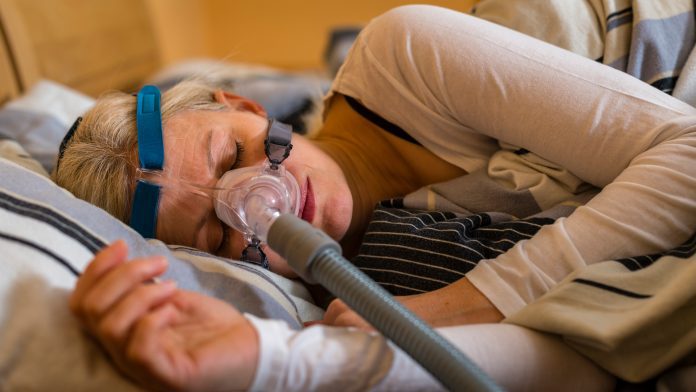
A University of Bergen study has revealed that reduced hormone levels in postmenopausal women may be a cause of obstructive sleep apnoea.
The research identified that middle-aged women with low levels of oestrogen and progesterone are at an increased risk of snoring and are more likely to report symptoms of obstructive sleep apnoea. The University of Bergen study may help to develop future hormone interventions to combat what can be a deadly condition if left untreated.
The findings are published in the open-access journal PLOS ONE.
What is obstructive sleep apnoea?
Obstructive sleep apnoea is a condition where the muscles in the back of the throat relax too much during sleep, narrowing the airways as you breathe in and obstructing breathing for ten seconds or longer. This can result in a build-up of carbon dioxide and a decrease in oxygen in the blood.
The brain will briefly wake up obstructive sleep apnoea patients due to impaired breathing. However, this is so quick they may not even remember it, with individuals characteristically making gasping and choking sounds that can be misdiagnosed as snoring. This process can be repeated between five to 30 times per hour during sleep, preventing patients from reaching a deep sleep which causes exhaustion during waking hours.
Common symptoms of obstructive sleep apnoea include loud snoring, tiredness during the daytime, abrupt awakenings, waking up with a dry mouth or sore throat, morning headache, high blood pressure, difficulty concentrating, mood changes, and decreased libido.
Although obstructive sleep apnoea is known to be more common in women after menopause, this is the first population-based study to analyse if this is due to changes in sex hormone levels.
The impact of hormone levels
For their study, the researchers employed data from the European Community Respiratory Health Survey, performed across seven countries between 2010 and 2012, identifying 774 women aged 40 to 67. The participants completed questionnaires on respiratory health, women’s health factors, lifestyle, sleep, and provided blood samples for hormone analysis.
The team identified that 551 women (71.2%) reported they weretold they snored, with 411 also revealing other symptoms of obstructive sleep apnoea. Across all participants, a doubling of estrone serum concentrations was associated with 19% decreased odds of snoring, and a doubling of progesterone levels was linked to a 9% reduced odds of snoring.
In women who snored, the doubling of three oestrogens (17β-estradiol, estrone and estrone 3-sulfate) was associated with a 17% to 23% decreased risk of breathing irregularly during sleep. Moreover, a doubling of progesterone concentration was linked to a 12% reduced chance of being woken up with a choking sensation in the previous year.
The researchers explained that adjusting female sex hormones could potentially be an effective method to decrease the incidence and morbidity of obstructive sleep apnoea but explained that more longitudinal studies are needed to confirm their study.
The researchers concluded: “Female sex hormones are crucial for health and disease, and especially after menopause, the hormone status should be considered to develop holistic treatment strategies.”









